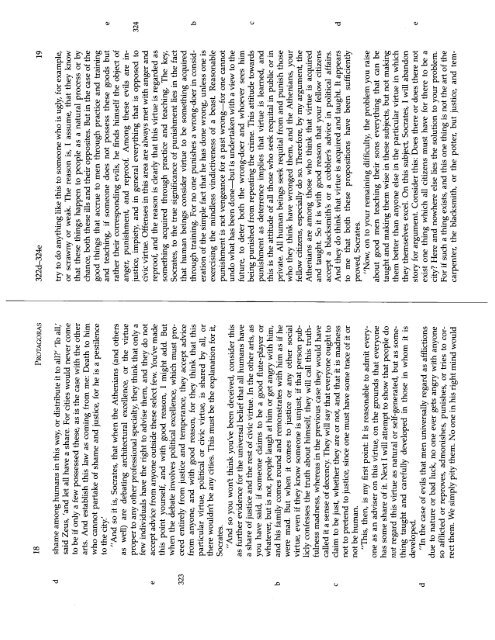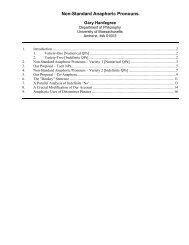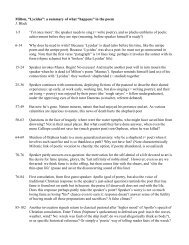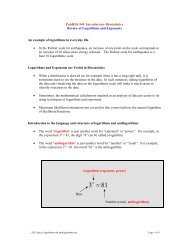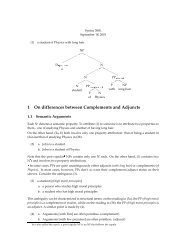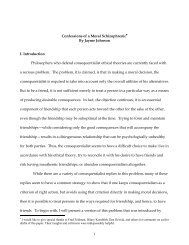Protagoras (PDF)
Protagoras (PDF)
Protagoras (PDF)
You also want an ePaper? Increase the reach of your titles
YUMPU automatically turns print PDFs into web optimized ePapers that Google loves.
18 PRoTAGois 322d—324e 19<br />
d shame among humans in this way, or distribute it to all?’ ‘To all,’<br />
said Zeus, ‘and let all have a share. For cities would never come<br />
to be if only a few possessed these, as is the case with the other<br />
arts. And establish this law as coming from me: Death to him<br />
who cannot partake of shame and justice, for he is a pestilence<br />
to the city.’<br />
“And so it is, Socrates, that when the Athenians (and others<br />
as well) are debating architectural excellence, or the virtue<br />
proper to any other professional specialty, they think that only a<br />
few individuals have the right to advise them, and they do not<br />
e accept advice from anyone outside these select few. You’ve made<br />
this point yourself, and with good reason, I might add. But<br />
when the debate involves political excellence, which must pro-<br />
323 ceed entirely from justice and temperance, they accept advice<br />
from anyone, and with good reason, for they think that this<br />
particular virtue, political or civic virtue, is shared by all, or<br />
there wouldn’t be any cities. This must be the explanation for it,<br />
Socrates.<br />
“And so you wont think you’ve been deceived, consider this<br />
as further evidence for the universal belief that all humans have<br />
a share of justice and the rest of civic virtue. In the other arts, as<br />
you have said, if someone claims to be a good flute-player or<br />
whatever, but is not, people laugh at him or get angry with him,<br />
b and his family comes round and remonstrates with him as if he<br />
were mad. But when it comes to justice or any other social<br />
virtue, even if they know someone is unjust, if that person pub<br />
licly confesses the truth about himself, they will call this truth<br />
fulness madness, whereas in the previous case they would have<br />
called it a sense of decency. They will say that everyone ought to<br />
c claim to be just, whether they are or not, and that it is madness<br />
not to pretend to justice, since one must have some trace of it or<br />
not be human.<br />
“This, then, is my first point: It is reasonable to admit every<br />
one as an adviser on this virtue, on the grounds that everyone<br />
has some share of it. Next I will attempt to show that people do<br />
not regard this virtue as natural or self-generated, but as some<br />
thing taught and carefully developed in those in whom it is<br />
developed.<br />
d “In the case of evils that men universally regard as afflictions<br />
due to nature or bad luck, no one ever gets angry with anyone<br />
so affficted or reproves, admonishes, punishes, or tries to cor<br />
rect them. We simply pity them. No one in his right mind would<br />
try to do anything like this to someone who is ugly, for example,<br />
or scrawny or weak. The reason is, I assume, that they know<br />
that these things happen to people as a natural process or by<br />
chance, both these ills and their opposites. But in the case of the<br />
good things that accrue to men through practice and training<br />
and teaching, if someone does not possess these goods but<br />
rather their corresponding evils, he finds himself the object of<br />
anger, punishment, and reproof. Among these evils are in<br />
justice, impiety, and in general everything that opposed is to<br />
civic virtue. Offenses in this area are always met with anger and<br />
reproof, and the reason is clearly that this virtue is regarded as<br />
something acquired through practice and teaching. The key,<br />
Socrates, to the true significance of punishment lies in the fact<br />
that human beings consider virtue be something acquired<br />
to<br />
through training. no one punishes wrong-doer in consid<br />
For a<br />
eration of the simple fact that he has done wrong, unless one is<br />
exercising the mindless vindictiveness of a beast. Reasonable<br />
punishment is not vengeance for a past wrong—for one cannot<br />
undo what has been done—but is undertaken with a view to the<br />
future, to deter both the wrong-doer and whoever sees him<br />
being punished from repeating the crime. This attitude towards<br />
punishment as deterrence implies that virtue is learned, and<br />
this is the attitude of all those who seek requital in public or in<br />
private. All human beings seek requital from and punish those<br />
who they think have wronged them, and the Athenians, your<br />
fellow citizens, especially do so. Therefore, by my argument, the<br />
Athenians are among those who think that virtue is acquired<br />
and taught. So it is with good reason that your fellow citizens<br />
accept a blacksmith’s or a cobbler’s advice in political affairs.<br />
And they do think that virtue is acquired and taught. It appears<br />
to me that both these propositions have been sufficiently<br />
proved, Socrates.<br />
“Now, on to your remaining difficulty, the problem you raise<br />
about good men teaching their sons everything that can be<br />
taught and making them wise in these subjects, but not making<br />
them better than anyone else in the particular virtue in which<br />
they themselves excel. On this subject, Socrates, I will abandon<br />
story for argument. Consider this: Does there or does there not<br />
exist one thing which all citizens must have for there to be a<br />
city? Here and nowhere else the solution to your problem.<br />
lies<br />
For if such a thing and this one thing not the art the<br />
exists, is of<br />
e<br />
324<br />
b<br />
c<br />
d<br />
e<br />
carpenter, the blacksmith, or the potter, but justice, and tern-


